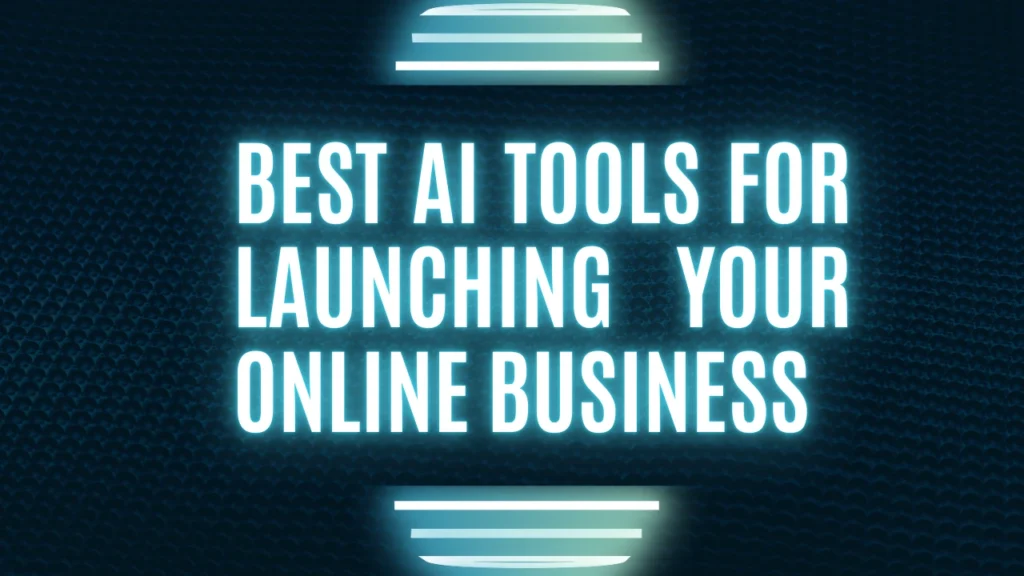Table of Contents
Introduction
The digital era has brought unparalleled opportunities for aspiring entrepreneurs to start their own online businesses. With just a computer and an internet connection, anyone can turn a passion or idea into a thriving venture. This democratization of entrepreneurship has inspired millions to embrace the flexibility and scalability of online businesses. However, the competition in the digital space is fierce, requiring innovative strategies and tools to stay ahead.
This is where Artificial Intelligence (AI) steps in as a game-changer. AI is revolutionizing the way online businesses are built and operated. From automating mundane tasks to delivering hyper-personalized customer experiences, AI equips entrepreneurs with the power to work smarter, not harder. Whether you’re brainstorming your business idea or scaling an existing venture, AI tools can help streamline processes, cut costs, and enhance productivity.
In this guide, you’ll discover how AI can transform your online business journey. We’ll explore the best AI tools for every step of the process—from idea generation to income generation. By the end, you’ll have a roadmap to leverage AI for success in the competitive online marketplace.
Understanding AI in Online Business
What is AI, and Why Does it Matter for Entrepreneurs?
Artificial Intelligence, often abbreviated as AI, refers to computer systems designed to mimic human intelligence. These systems can analyze data, recognize patterns, and make decisions, often faster and more accurately than humans. For entrepreneurs, AI isn’t just a buzzword; it’s a resource that can help solve real business challenges.
AI is vital for modern entrepreneurs because it bridges the gap between expertise and execution. Even without technical knowledge, entrepreneurs can use AI to access insights that would typically require an entire team of experts. By leveraging AI, you can automate repetitive tasks, improve decision-making, and focus on what matters most: growing your business.
Benefits of AI for Starting and Scaling Online Businesses
- Efficiency and Automation: AI tools can handle time-consuming tasks like email responses, data analysis, and social media scheduling. This frees up your time to concentrate on strategic initiatives.
- Cost-Effectiveness: AI eliminates the need for large teams or expensive consultants, making it an affordable solution for startups and small businesses.
- Personalization: AI can analyze customer behavior to create highly tailored experiences, boosting engagement and loyalty.
- Data-Driven Insights: With AI-powered analytics, you can make informed decisions based on real-time data, minimizing guesswork.
- Scalability: As your business grows, AI can scale with you, helping manage larger workloads and customer bases without compromising quality.
Want to leverage AI to build a profitable online business but don’t know where to start? 🚀 Our beginner-friendly guide walks you through everything you need to know to launch and scale with AI. Don’t miss out—grab your copy of “How to Build an AI-Powered Online Business: A Beginner’s Guide” today! 👉 Get your eBook now!
Examples of Businesses Successfully Using AI
- E-commerce Stores: Platforms like Amazon use AI to recommend products to customers based on their browsing history and preferences, boosting sales.
- Content Creators: Bloggers and YouTubers use AI tools like Jasper and Canva to generate ideas, write scripts, and design visuals.
- Customer Support: Companies like Airbnb use AI chatbots to provide instant, 24/7 customer service, enhancing user satisfaction.
Laying the Groundwork for Your Online Business
Finding Your Niche with AI-Powered Market Research Tools
The foundation of any successful online business is identifying a profitable niche. AI tools like Semrush and AnswerThePublic can help you uncover trending topics, identify audience pain points, and analyze competitor strategies. By understanding market demand through AI-driven insights, you can confidently choose a niche that aligns with your interests and has high growth potential.
Validating Your Idea Using AI-Driven Analytics
Before diving headfirst into your business idea, it’s crucial to validate it. AI tools such as Google Trends and BuzzSumo can analyze search patterns and social media trends to determine if your idea has an audience. Additionally, AI-powered surveys and feedback platforms can help you gather real-world opinions from potential customers. This ensures you’re investing time and resources into an idea that resonates with your target market.
Building a Business Plan with AI Assistance
Once your idea is validated, the next step is crafting a solid business plan. AI tools like LivePlan and Bizplan simplify this process by providing templates, financial projections, and strategy suggestions tailored to your niche. With AI’s assistance, you can create a comprehensive plan that outlines your goals, target audience, marketing strategy, and revenue model.
By harnessing these tools, you’ll have a strong foundation to launch and grow your online business confidently.
If you’re looking to start and grow your online business successfully, don’t miss out on our expert guide! 🚀 Get your copy of “From Zero to Hero: A Step-by-Step Guide to Making Money Online” today and start building your financial freedom. 👉 Grab your eBook now!
AI Tools for Ideation and Creativity
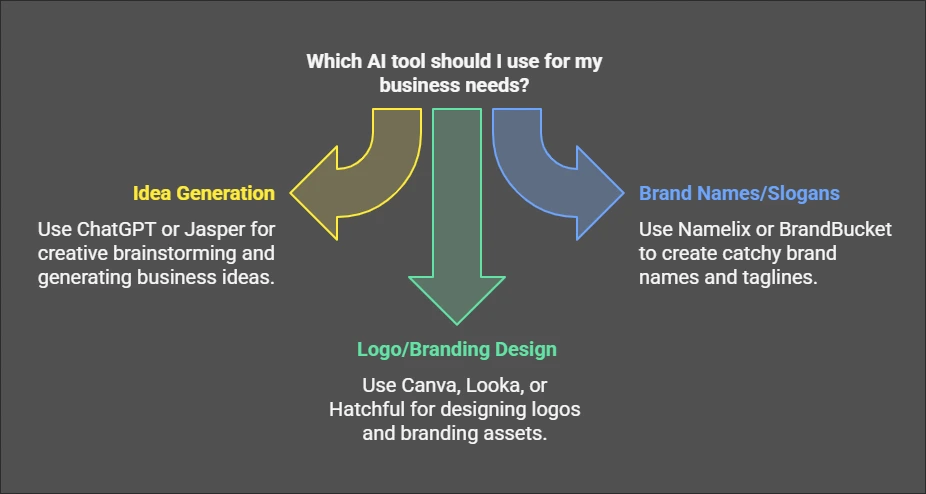
Brainstorming Ideas with AI Tools Like ChatGPT and Jasper
Coming up with fresh, innovative ideas is often the first challenge when starting an online business. AI tools like ChatGPT and Jasper excel at brainstorming by generating creative ideas tailored to your niche. Whether you need product concepts, blog post topics, or marketing campaign ideas, these tools can produce an array of options in seconds. Simply input a prompt, and watch AI deliver a range of unique suggestions to inspire your next move.
Crafting Brand Names and Slogans Using AI Generators
Your brand name and slogan are the cornerstones of your identity, and AI tools make crafting them effortless. Platforms like Namelix and BrandBucket analyze your business goals and generate catchy, memorable names and taglines. By incorporating keyword insights and creative algorithms, these tools ensure your brand stands out while resonating with your target audience.
Designing Logos and Branding with AI Design Platforms
A compelling logo is essential for building brand recognition, and AI design tools make this process fast and affordable. Applications like Canva, Looka, and Hatchful offer intuitive platforms where you can design logos, select brand colors, and create marketing assets. With AI-powered customization features, you can craft professional visuals even if you have no design experience.
Building Your Online Presence
AI Tools for Creating Professional Websites Effortlessly
Your website is often the first interaction customers have with your brand, so it needs to make a great impression. AI website builders like Wix ADI and Squarespace simplify the process, enabling you to create stunning, mobile-friendly websites with minimal effort. These tools use AI to recommend layouts, color schemes, and content placements tailored to your business needs.
Optimizing Website Layouts for User Experience with AI Insights
A seamless user experience is key to retaining visitors and driving conversions. Tools like Hotjar and Crazy Egg analyze user behavior on your site, providing AI-driven insights into areas for improvement. These platforms highlight bottlenecks in navigation, optimize page load times, and suggest changes to enhance usability.
Crafting Compelling Content for Your Site Using AI Writers
Once your site is live, filling it with high-quality, engaging content is essential. AI writing tools like Writesonic and Copy.ai can generate persuasive website copy, including product descriptions, about pages, and service offerings. These tools adapt to your brand voice, ensuring your content feels authentic and connects with your audience.
Content Creation for Marketing
Generating Blog Posts and Articles with AI Tools
Content marketing is a powerful strategy to build credibility and attract traffic to your site. AI tools like Surfer SEO and Frase can help you create optimized blog posts and articles tailored to your target keywords. These platforms provide structure, generate engaging content, and ensure your posts rank well in search engines.
Automating Social Media Content Creation
Maintaining a consistent social media presence can be time-intensive, but AI tools simplify the process. Platforms like Buffer and Hootsuite Insights automate the scheduling and creation of posts, while tools like Lately.ai transform existing content into bite-sized social media updates. These solutions ensure your social media marketing is both efficient and effective.
Creating Video Scripts and Visuals with AI
Video content is increasingly popular for engaging audiences, and AI tools make production easier than ever. Apps like Pictory and Synthesia can generate video scripts, edit footage, and even create AI-powered avatars for video content. These tools help entrepreneurs deliver professional-quality videos without expensive equipment or expertise.
AI Tools for SEO and Online Visibility
Keyword Research and Optimization Using AI Tools
SEO is the backbone of online visibility, and AI tools like Ahrefs and Semrush take the guesswork out of keyword research. These platforms analyze search trends, competitor strategies, and ranking opportunities to identify the most valuable keywords for your content.
Enhancing Search Engine Rankings with AI-Driven Strategies
Optimizing your website for search engines is easier with AI tools. Tools like Yoast SEO and RankMath provide actionable recommendations to improve your content’s readability, meta descriptions, and internal linking. AI-driven strategies ensure your site meets the ever-changing demands of search engine algorithms.
Monitoring and Analyzing Traffic with AI Analytics Platforms
Understanding how visitors interact with your site is crucial for refining your strategy. AI-powered analytics tools like Google Analytics 4 and Adobe Analytics provide detailed reports on traffic sources, user behavior, and conversion rates. These insights empower you to make data-driven decisions that enhance your site’s performance and user experience.
By incorporating these AI tools into your workflow, you can elevate your online business strategy and achieve sustainable growth in the competitive digital landscape.
Struggling to create SEO-optimized articles, blog posts, or affiliate content effortlessly? ✍️ Try this powerful AI writing tool that generates high-quality content in 1 click, supports 48 languages, and even auto-posts to WordPress with AI-generated images! 🚀 Boost your content game today! 👉 Try it now!
E-Commerce Solutions Powered by AI
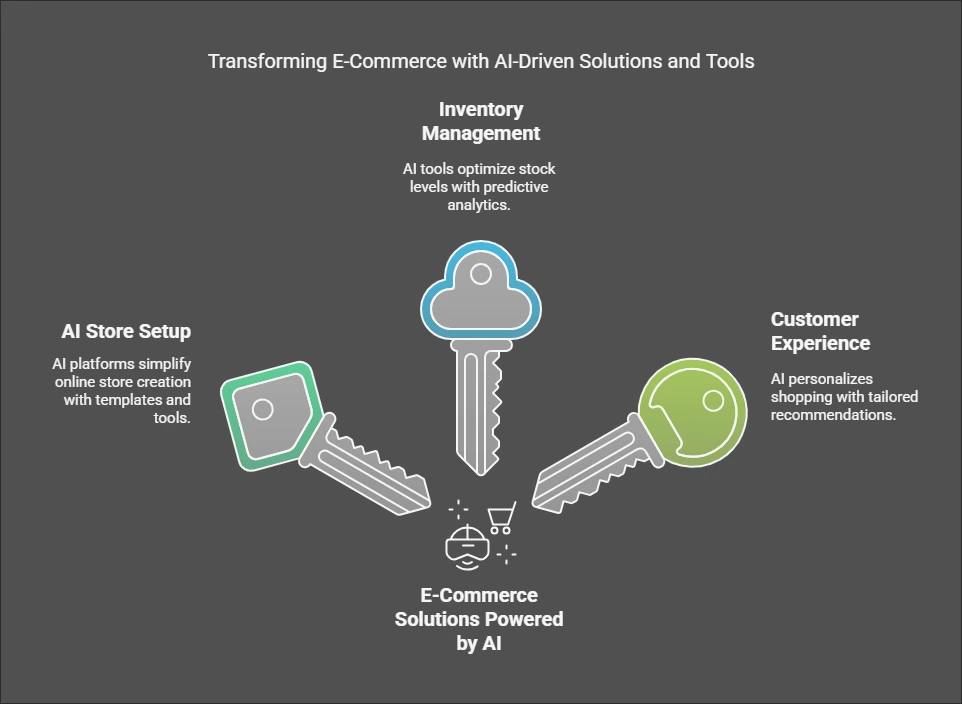
Setting Up Online Stores with AI Platforms Like Shopify
Starting an e-commerce business has never been easier, thanks to AI-powered platforms like Shopify. These platforms simplify the setup process with AI-driven templates, product management tools, and personalized recommendations for your store design. Shopify’s AI assistant helps entrepreneurs create professional, user-friendly online stores, even if they lack technical expertise.
Inventory Management and Product Recommendations Using AI
AI is revolutionizing inventory management by offering predictive analytics and real-time tracking. Tools like Zoho Inventory and TradeGecko ensure optimal stock levels by forecasting demand based on historical data and market trends. Additionally, AI tools like Dynamic Yield can analyze customer behavior to provide personalized product recommendations, boosting sales and improving customer satisfaction.
Personalized Customer Shopping Experiences with AI Tools
A personalized shopping experience can significantly impact customer loyalty and conversions. AI tools like Nosto and Vue.ai analyze user behavior to offer tailored recommendations, dynamic pricing, and even personalized email follow-ups. By understanding individual preferences, these tools create a shopping journey that feels uniquely tailored to each customer.
AI for Marketing and Advertising
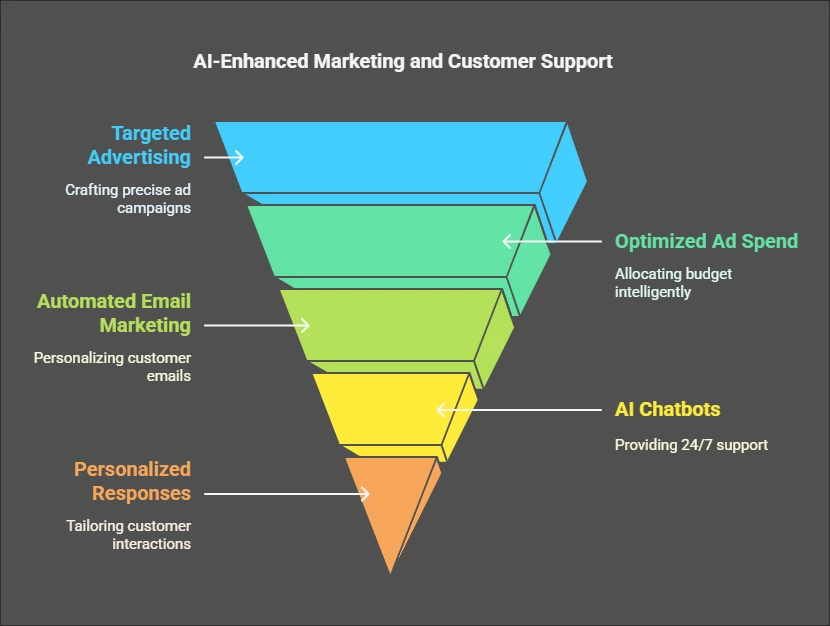
Creating Targeted Ad Campaigns Using AI Algorithms
AI algorithms are transforming digital advertising by enabling precise targeting. Tools like Adzooma and Acquisio analyze audience demographics, behavior, and preferences to craft highly targeted ad campaigns. By delivering the right message to the right audience, AI helps maximize ROI and minimize wasted ad spend.
Optimizing Ad Spend with AI Analytics
Managing an advertising budget can be challenging, but AI tools make it easier to track and optimize spending. Platforms like Google Ads Smart Bidding and AdRoll use AI to allocate budgets intelligently, focusing resources on high-performing campaigns. These tools analyze real-time data to adjust bids and ensure your advertising dollars are spent effectively.
AI Tools for Email Marketing Automation
Email marketing remains one of the most effective ways to connect with customers, and AI takes it to the next level. Tools like getresponse and ActiveCampaign automate email personalization, timing, and content suggestions. By analyzing customer behavior, these platforms ensure your emails are relevant, engaging, and delivered at the perfect moment.
AI Tools for Customer Support
Implementing AI Chatbots for 24/7 Customer Support
AI chatbots are a game-changer for customer support, offering instant assistance around the clock. Tools like Zendesk AI and Intercom can handle common queries, freeing up human agents for more complex issues. These bots use natural language processing to understand and respond to customer questions, ensuring a seamless support experience.
AI Solutions for Handling Customer Queries and Feedback
Beyond chatbots, AI tools like HubSpot Service Hub and Freshdesk can analyze customer queries and feedback to identify recurring issues and areas for improvement. These insights help businesses refine their products, services, and overall customer experience.
Enhancing User Experience with Personalized AI Responses
Personalization is key to great customer service. AI tools can analyze a customer’s purchase history, preferences, and interactions to deliver tailored responses. This makes customers feel valued and improves the overall satisfaction level of their experience with your business.
Streamlining Operations with AI
AI-Driven Project Management Tools for Efficient Workflows
Managing projects and teams becomes more efficient with AI-powered tools like Monday.com and Asana. These platforms use AI to assign tasks, track progress, and identify bottlenecks. AI insights ensure that projects stay on schedule and teams remain productive.
Automation of Repetitive Tasks Using AI Software
AI excels at automating repetitive tasks, saving time and reducing errors. Tools like Zapier and UiPath can automate tasks such as data entry, email sorting, and report generation. This allows you to focus on high-value activities that drive your business forward.
AI Tools for Financial Management and Invoicing
Financial management is critical for any business, and AI tools simplify the process. Platforms like QuickBooks and Xero use AI to automate invoicing, expense tracking, and financial reporting. These tools help you maintain accurate records, identify trends, and make informed financial decisions.
By integrating AI into your operations, marketing, and customer support, you can streamline processes, improve customer satisfaction, and ultimately, grow your online business efficiently.
Scaling Your Business with AI
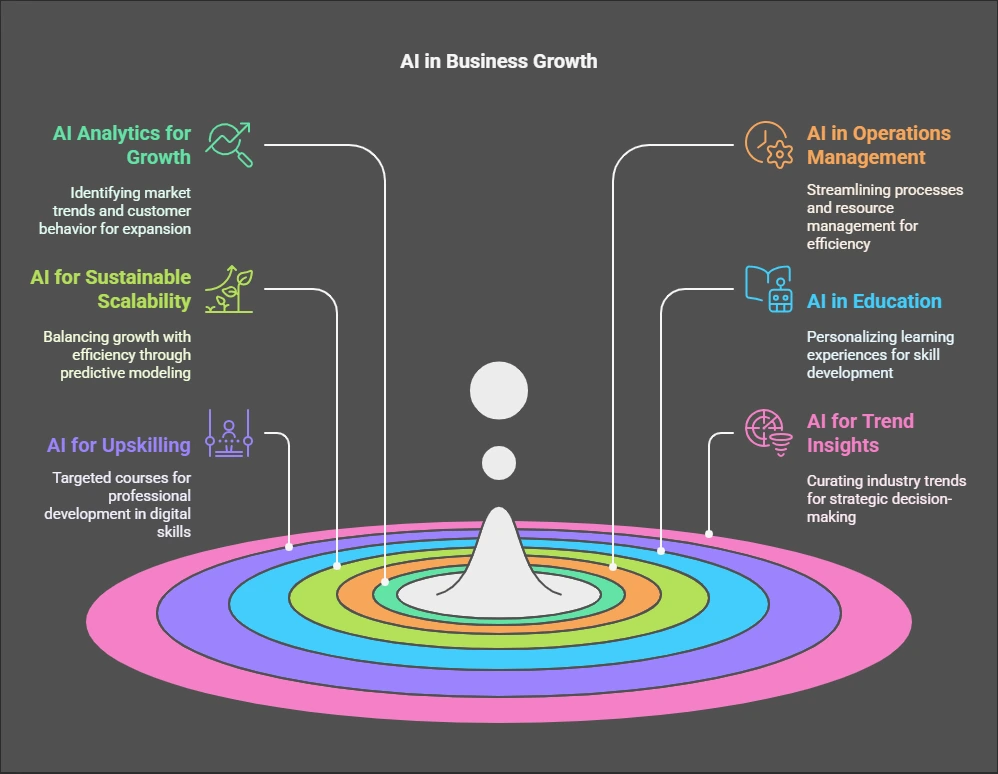
Identifying Growth Opportunities Through AI Analytics
AI analytics tools like Google Analytics 4 and Tableau provide valuable insights into market trends, customer behavior, and emerging opportunities. These platforms analyze vast amounts of data to uncover patterns that may not be obvious, helping businesses identify areas for growth, potential new markets, and untapped customer segments.
AI for Managing Expanding Operations and Resources
As businesses grow, managing operations can become increasingly complex. AI-powered tools like SAP AI and Odoo simplify resource management by automating workflows, optimizing supply chains, and managing employee productivity. These tools ensure that expanding operations remain efficient and scalable.
Strategies to Leverage AI for Sustainable Scalability
Sustainable scalability requires balancing growth with efficiency, and AI can help achieve this through predictive modeling and resource optimization. Tools like Forecast AI allow businesses to simulate different growth scenarios, helping them plan for increased demand while maintaining operational stability. By integrating AI into your scalability strategy, you can minimize risks and maximize returns.
AI-Powered Learning and Skill Development
Online Courses and Tutorials Enhanced by AI
AI is revolutionizing education with platforms like Coursera, Udemy, and Khan Academy, which use AI to tailor learning experiences. Personalized recommendations, interactive quizzes, and adaptive feedback ensure that learners gain the most relevant knowledge efficiently.
Leveraging AI to Upskill in Digital Marketing and Management
AI tools like Skillsoft Percipio and LinkedIn Learning help professionals develop skills in areas such as digital marketing, project management, and analytics. These platforms identify skill gaps and recommend targeted courses, making upskilling faster and more focused.
Staying Updated With Industry Trends Through AI Insights
Staying ahead in business requires keeping up with industry trends. AI platforms like Feedly and BuzzSumo curate the latest news, reports, and insights tailored to your industry. These tools use AI algorithms to analyze global data, ensuring you’re always informed about the next big thing in your field.
AI for Competitive Analysis
Monitoring Competitors Using AI Tools
AI tools like Crayon and Kompyte enable businesses to track competitor strategies, from pricing and product launches to marketing campaigns. These platforms gather and analyze competitor data, providing actionable insights to stay one step ahead in the market.
Identifying Market Gaps With AI Insights
AI-powered tools like GrowthBar and SEMrush analyze market data to identify gaps where your business can thrive. Whether it’s an underserved customer segment or an unaddressed need, these tools highlight opportunities for innovation and expansion.
Using AI for Pricing Strategies
Pricing can make or break a business, and AI tools like Prisync and DynamicPricing offer data-driven recommendations. These platforms analyze competitor prices, customer behavior, and market demand to help businesses set optimal pricing strategies that maximize profitability.
Security and Privacy Concerns in AI Usage
Protecting Your Data While Using AI Tools
Data protection is a top concern when using AI tools. Platforms like Norton and McAfee provide AI-powered solutions to secure sensitive business data against breaches. Always ensure that the AI tools you use have robust encryption and data privacy measures in place.
Ensuring Compliance With Data Protection Regulations
Compliance with regulations like GDPR and CCPA is essential for businesses using AI. Tools like OneTrust help ensure that your business adheres to these laws by managing customer consent, data access, and regulatory reporting. Compliance not only protects your business from legal issues but also fosters trust with your audience.
Building Trust With Customers Through Ethical AI Usage
Transparency and ethical AI usage are key to building long-term customer relationships. Share clear policies about how your AI tools collect and use data, and prioritize tools that align with ethical standards. By showing a commitment to ethical practices, you can gain customer loyalty and establish a positive reputation in the market.
By integrating AI into learning, operations, and competitive analysis, while addressing security concerns, businesses can not only scale but also maintain trust and integrity in a competitive marketplace.
Challenges of Using AI for Online Business
Common Pitfalls and How to Avoid Them
While AI offers immense potential, businesses often stumble due to over-reliance on automation or choosing the wrong tools. Avoid pitfalls by researching tools thoroughly, starting small, and gradually integrating AI into your operations. Clear goals and regular evaluations can also prevent missteps.
Addressing the Learning Curve of AI Adoption
AI technology often comes with a learning curve that can intimidate new users. Overcome this by investing time in training, leveraging user-friendly platforms, and taking advantage of tutorials or community support provided by AI tool developers.
Balancing AI Automation With Human Creativity
AI excels in efficiency, but it can’t replace the creativity and empathy of human input. Use AI to handle repetitive tasks while focusing your energy on strategy, innovation, and personalizing customer experiences. Striking this balance ensures a well-rounded approach to business operations.
Budgeting for AI Tools
Understanding the Cost of AI Tools and ROI
AI tools vary in cost, from free versions to premium subscriptions. Understanding your budget and potential return on investment (ROI) is crucial. For instance, AI-powered analytics tools may have higher upfront costs but can drive significant long-term growth by optimizing operations and improving decision-making.
Free vs. Premium AI Tools: What to Choose?
Free AI tools like Grammarly Free or Canva Free are great starting points, but premium options often provide advanced features and integrations. Evaluate your business needs and consider upgrading once free tools no longer meet your requirements.
Tips for Cost-Effective AI Adoption
To adopt AI cost-effectively, start with a few essential tools that address your immediate needs. Look for discounts, bundle offers, or annual plans to save money. Regularly review tool performance to ensure you’re getting value for your investment.
Case Studies: Success Stories With AI
Real-Life Examples of Online Businesses Powered by AI
Businesses like Stitch Fix leverage AI for personalized product recommendations, while Shopify enables entrepreneurs to set up AI-driven e-commerce stores. These examples show how AI can create seamless customer experiences and boost sales.
Lessons Learned From Successful Entrepreneurs
Successful entrepreneurs emphasize starting small, experimenting with various tools, and being adaptable to new technologies. They also highlight the importance of balancing AI automation with genuine human interactions to build trust and loyalty.
Inspiration for Your AI-Driven Journey
AI success stories prove that with the right tools and strategies, anyone can achieve remarkable results. Let these stories motivate you to embrace AI and explore its endless possibilities for your business.
Future of AI in Online Business
Emerging Trends in AI Technology
AI is advancing rapidly, with emerging trends like generative AI, conversational commerce, and hyper-personalization. These innovations will continue reshaping how businesses operate and interact with customers.
Predictions for AI’s Role in Entrepreneurship
Experts predict that AI will become indispensable in entrepreneurship, automating more processes, improving decision-making, and enabling faster innovation. Staying ahead in this evolving landscape requires proactive adaptation to these changes.
Preparing for an AI-Dominated Business Landscape
Prepare by continuously upskilling, exploring new AI tools, and adopting an experimental mindset. Staying informed about advancements ensures that your business remains competitive in the AI-driven future.
Conclusion
Recap of Key Points Covered
We’ve explored how AI can revolutionize online businesses, from ideation and branding to scaling and customer support. We also discussed budgeting, real-world success stories, and future trends.
Encouragement to Take the First Step With AI Tools
The journey to integrating AI begins with a single step—trying one tool that fits your needs. Whether it’s for content creation, marketing, or operations, there’s an AI tool designed to simplify and enhance your workflow.
Final Thoughts on the Potential of AI for Online Businesses
AI offers endless possibilities for innovation, efficiency, and growth. By embracing this technology, you can transform your ideas into income and stay ahead in a competitive market.
FAQs
What Are the Best Free AI Tools for Beginners?
Some great free tools include Grammarly Free for writing, Canva Free for design, and Google Analytics for data insights.
How Can AI Help Me Start an Online Business With No Technical Skills?
AI tools simplify complex tasks like website creation, marketing, and data analysis, making it easier for non-technical users to launch and run an online business.
Is AI Reliable for Managing Customer Support?
Yes! AI chatbots like Intercom and Zendesk AI offer 24/7 support and handle common queries effectively, improving customer satisfaction.
What Industries Benefit Most From AI Tools?
AI benefits a wide range of industries, including e-commerce, marketing, healthcare, finance, and education, by enhancing efficiency and customer experiences.
Are AI Tools Worth the Investment for Small Businesses?
Absolutely. AI tools save time, reduce costs, and drive growth, making them a worthwhile investment for businesses of all sizes. Start small and scale up as your needs grow.

